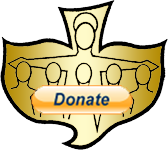|
|
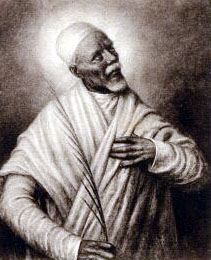 1791-1855
1791-1855Converted to Christianity by Vincentian missionaries in 1844, Michael joined the Order himself. He was ordained in 1851, and served in the Apostolic Vicariate of Abyssinia (Ethiopia). Arrested for his faith with four companions whose names have been lost to us during the persecution of Negus Theodore II. Dragged from place to place, he died a prisoner and martyr. Blessed Michael, pray for us! 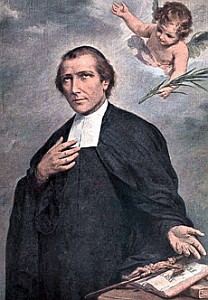 French.
French.1745-1792 Son of a wealthy French wine merchant. Though his father wanted him to pursue the family business, Nicholas early discerned a call to religious life. On 25 March 1767, he entered the novitiate of the Brothers of Christian Schools, and took the name Solomon. A good student, recognized for his piety and deep prayer life. Spent several years teaching at various schools throughout France, and witnessed much of the political turmoil tearing his country apart. Director of novices for his community, and frequent correspondent with his brothers and sisters on matters spiritual. Procurator in the Congregation's motherhouse. Secretary to the superior general of the order. In the summer of 1792, Brother Solomon, along with many other priests and religious, was imprisoned, and martyred as part of the suppression of Christianity of the French Revolution. "As for us, we hold to what we believed ten and twenty years ago; to what our forefathers believed one hundred years ago, and one thousand years ago, and to that which the whole Catholic world has always believed." - Brother Solomon Le Clerq Blessed Solomon, pray for us! 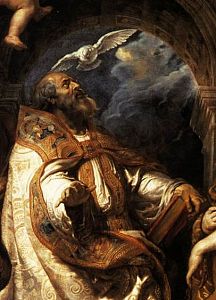 540-590
540-590Born in Rome. Son of Gordianus, a Roman regionarius, and Saint Silvia of Rome. Nephew of Saint Emiliana and Saint Tarsilla. Great-grandson of Pope Saint Felix III. Educated by the finest teachers in Rome, Italy. Prefect of Rome for a year, then he sold his possessions, turned his home into a Benedictine monastery, and used his money to build six monasteries in Sicily and one in Rome. Benedictine monk. Upon seeing English children being sold in the Roman Forum, he became a missionary to England. Elected 64th Pope by unanimous acclamation on 3 September 590, the first monk to be chosen. Sent Saint Augustine of Canterbury and a company of monks to evangelize England, and other missionaries to France, Spain, and Africa. Collected the melodies and plain chant so associated with him that they are now known as Gregorian Chants. One of the four great Doctors of the Latin Church. Wrote seminal works on the Mass and Divine Office, several of them dictated to his secretary, Saint Peter the Deacon. "The proof of love is in the works. Where love exists, it works great things. But when it ceases to act, it ceases to exist." - Saint Gregory the Great 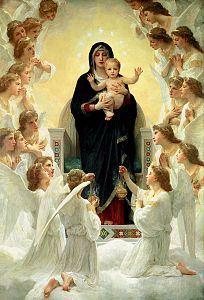 On September 4, 1781 a group of settlers along with Franciscan priests and Spanish soldiers founded the City of Los Angeles. Following the custom of the Franciscans to name the places they settled after the saint whose feast day was that particular day of the founding the Franciscans named the new settlement: El Pueblo de Nuestra Senora, Reina de los Angeles. The town of Our Lady, Queen of the Angels. The town became the city of Los Angeles named after Our Lady Queen of Angels. The original church still standing in downtown Los Angeles is dedicated to her honor. The new Cathedral of the Archdiocese of Los Angeles standing nearby is entitled Our Lady of the Angels in deference to the older church.
On September 4, 1781 a group of settlers along with Franciscan priests and Spanish soldiers founded the City of Los Angeles. Following the custom of the Franciscans to name the places they settled after the saint whose feast day was that particular day of the founding the Franciscans named the new settlement: El Pueblo de Nuestra Senora, Reina de los Angeles. The town of Our Lady, Queen of the Angels. The town became the city of Los Angeles named after Our Lady Queen of Angels. The original church still standing in downtown Los Angeles is dedicated to her honor. The new Cathedral of the Archdiocese of Los Angeles standing nearby is entitled Our Lady of the Angels in deference to the older church.Our Lady, Queen of Angels, pray for our Archdiocese and for us always! 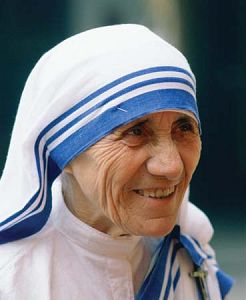 1910-1997
1910-1997Born Agnes Gonxha Bojaxhiu in Albania. Died in Calcutta, India. Daughter of an Albanian businessman who died when Agnes was nine years old. Nun, missionary and teacher in Calcutta, India in 1928. In 1948 she left the convent to work alone with the poor, and became an Indian citizen. She founded the Congregation of the Missionaries of Charity in 1950. In 1957 the Missionaries of Charity started their work with lepers and in disaster areas. She received the Pope John XXIII Peace Prize in 1971, the Jawaharlal Nehru Award for International Understanding in 1972, and the Nobel Peace Prize in 1979, and the Missionaries today work in 30 countries. "People are often unreasonable and self-centered. Forgive them anyway. If you are kind, people may accuse you of ulterior motives. Be kind anyway. If you are honest, people may cheat you. Be honest anyway. If you find happiness, people may be jealous. Be happy anyway. The good you do today may be forgotten tomorrow. Do good anyway. Give the world the best you have and it may never be enough. Give your best anyway. For you see, in the end, it is between you and God. It was never between you and them anyway." ― Mother Teresa St. Teresa of Calcutta, pray for us! 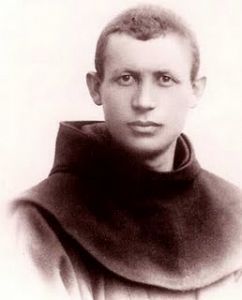 Franciscan Brother & Artist, 1900-1947
Franciscan Brother & Artist, 1900-1947Born in Santa Lucia del Piave near Venice, Claudio was the youngest of nine children and was accustomed to hard work in the fields. At the age of nine he lost his father. Six years later he was drafted into the Italian army, where he served more than three years. His artistic abilities, especially in sculpture, led to studies at Venice's Academy of Fine Arts, which awarded him a diploma with the highest marks in 1929. Even then he was especially interested in religious art. When Claudio entered the Friars Minor four years later, his parish priest wrote, "The Order is receiving not only an artist but a saint." Prayer, charity to the poor and artistic work characterized his life, which was cut short by a brain tumor. He died on the feast of the Assumption and was beatified in 1994. Claudio developed into such an excellent sculptor that his work still turns people toward God. No stranger to adversity, he met every obstacle courageously, reflecting the generosity, faith and joy that he learned from Francis of Assisi. In the beatification homily, Pope John Paul II said that Claudio made his sculpture "the privileged instrument" of his apostolate and evangelization. "His holiness was especially radiant in his acceptance of suffering and death in union with Christ's Cross. Thus by consecrating himself totally to the Lord's love, he became a model for religious, for artists in their search for God's beauty and for the sick in his loving devotion to the Crucified" (L'Osservatore Romano, Vol. 47, No. 1, 1994). Prayer for Artists... Bless the creators, O God of creation, who by their gifts make the world a more joyful and beautiful realm. Through their labors they teach us to see more clearly the truth around us. In their inspiration they call forth wonder and awe in our own living. In their hope and vision they remind us that life is holy. Bless all who create in your image, O God of creation. Pour your Spirit upon them that their hearts may sing and their works be fulfilling. Amen. 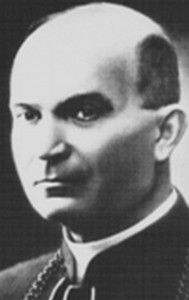 Polish.
Polish.1866-1931 Born to a pious and patriotic family. He entered the Lublin seminary in 1883, and was ordained on 5 July 1891. Parochial vicar of the Conversion of Saint Paul parish. Chaplain of Saint Vincent's hospital in 1892. Taught sacred scripture, catechetics, homiletics, moral theology and canon law at the Saint Vincent seminary for fourteen years. Vicar of the Lublin Cathedral from 1892 to 1894. Rector of the Greek Catholic Church of Saint Stanislaus in 1894. Founded an employment center in Lublin. Founded a professional school. Founded a home to help girls and women escape prostitution. Founded orphanages, and homes for the elderly. With the Congregation of the Handmaids of the Immaculate he founded a series of rural schools, which brought him persecution by the Russian authorities. Published several weekly and monthly newspapers, and in 1905 the magazine Polak-Katolik (Polish-Catholic). Moved to Warsaw in 1908 to increase the publications' reach, and start new ones. With the help of the future Pope Pius XI, he founded the Congregation of the Sisters of the Blessed Virgin Mary of Loreto in Warsaw on 31 July 1920 to help with the publication work. Prayer through the intercession of Bl. Fr. Ignatius Klopotowski..... O God, who breathed into the heart of blessed Ignatius a great love of the Incarnate Word and His Virgin Mother, awakening in him the desire to build Your kingdom through zealous imitation of Christ's love for the poor and neglected, and made him an apostle of the press and catholic publishing - look upon our humble plea and grant through his intercession that we might give ourselves completely and with joy to the work of the world's salvation. Eternal Father, infinitely good, through the powerful intercession of blessed Ignatius, grant me assistance in the needs, which I entrust to You this day. Through Christ Our Lord. Amen. 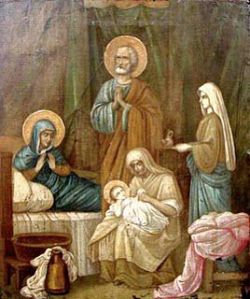 Probably originated after the Council of Ephesus in 431, which established her right to the title of "Mother of God." It was first mentioned in a hymn composed by Saint Romanus, an ecclesiastical lyrist of the Greek Church; adopted by the Roman Church in the 17th century.
Probably originated after the Council of Ephesus in 431, which established her right to the title of "Mother of God." It was first mentioned in a hymn composed by Saint Romanus, an ecclesiastical lyrist of the Greek Church; adopted by the Roman Church in the 17th century. Prayer.... O Chosen One among the daughters of Adam, admirable Mary, the Son of God delights in your birth, for He beholds the one chosen to be His Mother, and oh! such a beloved Mother. May your birth give joy to my soul also, by obtaining from your divine Son the grace to be born again spiritually to a holy life, perfectly conformed to yours, so that I may merit to obtain eternal glory. Amen. 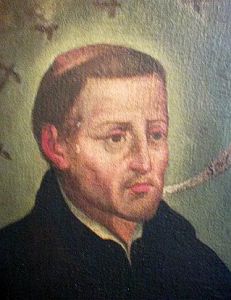 1581-1654
1581-1654Born in Spain. Died in Colombia. Farmer's son. Studied at the University of Barcelona. Jesuit from age 20. Priest. Influenced by Saint Alphonsus Rodriguez to become a missionary in America. Ministered, physically and spiritually, to slaves when they arrived in Cartegena, converting a reported 300,000, and working for humane treatment on the plantations for 40 years. Organized charitable societies among the Spanish in America similar to those organized in Europe by Saint Vincent de Paul. "After the life of Christ, no other biography has impressed me so much as that of the great Apostle St. Peter Claver." - Pope Leo XIII O God, Father of all peoples, you inspired St. Peter Claver, slave of slaves, with a great love and admirable patience in the service of his brothers, without distinction of race or social condition. Through his intersession and his merits, grant us to overcome all social discrimination, so as to love all with a generous heart and so become a source of unity among your children. We ask this through Christ Our Lord. Amen. 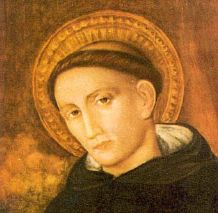 Italian. 1245-1305
Italian. 1245-1305Patron of the Souls of Purgatory His middle-aged parents, Compagnonus de Guarutti and Amata de Guidiani, were childless until a prayerful visit to a shrine of Saint Nicholas of Myra at Bari, Italy. In gratitude, the couple named their son Nicholas. Nicholas became an Augustinian friar at age 18, and a student with Blessed Angelus de Scarpetti. Monk at Recanati and Macerata in Italy. Ordained at age 25. Canon of Saint Saviour's. There he received visions of angels reciting the phrase "to Tolentino"; he took this as a sign to move to that city in 1274, and there he lived the rest of his life. Worked as a peacemaker in a city torn by civil war. Preached every day, wonder-worker and healer, and visited prisoners. He always told those he helped, "Say nothing of this." Received visions, including images of Purgatory, which friends ascribed to his lengthy fasts. Nicholas had a great devotion to the recently dead, praying for the souls in Purgatory as he travelled around his parish, and often late into the night. Once, when severely ill, he had a vision of the Blessed Virgin Mary, Augustine of Hippo and Monica. They told him to eat a certain type of roll that had been dipped in water. Cured, he began healing others by administering bread over which he recited Marian prayers. The rolls became known as Saint Nicholas Bread, and are still distributed at his shrine. Reported to have resurrected over one hundred dead children, including several who had drowned together. Legend says that the devil once beat Nicholas with a stick; the stick was displayed for years in the his church. A vegetarian, Nicholas was once served a roasted fowl; he made the sign of the cross over the bird, and it flew out a window. Nine passengers on ship going down at sea once asked for the aid of Saint Nicholas; he appeared in the sky, wearing the black Augustinian habit, radiating golden light, holding a lily in his left hand; with his right hand he quelled the storm. An apparition of the saint once saved the burning palace of the Doge of Venice by throwing a piece of blessed bread on the flames. Lord, God of holiness and light, you do not allow any shadow of darkness or evil in your sight, and so in your mercy you grant to those who have left this world burdened with sin, a time of purification, applying to them the spiritual treasures of your holy Church. Hear my prayer and through the merits of Our Lord Jesus Christ, the Blessed Virgin Mary, the saints, and all your faithful people, bring to an end this time of waiting for our beloved dead, especially ___________________________. In your providence you have chosen Saint Nicholas of Tolentino as a special intercessor on behalf of the departed. Hear also his fervent prayer for those whom I recommend to you through his intercession. Amen.  This 24th anniversary of 9/11 can be a time of renewal. Twenty four years ago we came together across religious, political, social and ethnic lines to stand as one people to heal wounds and defend against terrorism. As we face today's challenges of people out of work, families struggling, and the continuing dangers of wars and terrorism, let us summon the 9/11 spirit of unity to confront our challenges. Let us pray that the lasting legacy of 9/11 is not fear, but rather hope for a world renewed.
This 24th anniversary of 9/11 can be a time of renewal. Twenty four years ago we came together across religious, political, social and ethnic lines to stand as one people to heal wounds and defend against terrorism. As we face today's challenges of people out of work, families struggling, and the continuing dangers of wars and terrorism, let us summon the 9/11 spirit of unity to confront our challenges. Let us pray that the lasting legacy of 9/11 is not fear, but rather hope for a world renewed.In remembering the fateful events of September 11, 2001, may we resolve to put aside our differences and join together in the task of renewing our nation and world. Let us make our own the prayer of Pope Benedict XVI when he visited Ground Zero in New York in 2008: O God of love, compassion, and healing, look on us, people of many different faiths and traditions, who gather today at this site, the scene of incredible violence and pain.... God of understanding, overwhelmed by the magnitude of this tragedy, we seek your light and guidance as we confront such terrible events. Grant that those whose lives were spared may live so that the lives lost here may not have been lost in vain. Comfort and console us, strengthen us in hope, and give us the wisdom and courage to work tirelessly for a world where true peace and love reign among nations and in the hearts of all. 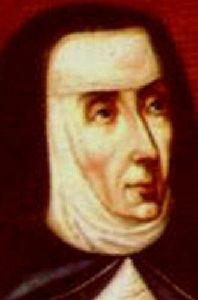 1562-1617
1562-1617Born in Genoa, Italy. Happily married to Angelo Strata from age seventeen to twenty-six. Mother of six. Widowed in 1587 at age 25, Victoria wanted to marry again because of her children, but a vision of the Virgin Mary convinced her to begin a single life of motherhood, chastity, prayer, and charity to the poor. When her children were grown, she and ten like-minded friends took vows of religion in 1605, and used a grant from a rich friend to found their first house. The group formed the beginnings of the Blue Annonciades or Blue Nuns which soon had houses scattered through Italy and France. Victoria served the rest of her life as the congregation's first superior. "Be brave and courageous. I shall take both you and your children under my wing. Live in peace, without anxiety. Trust yourself to my care and above all devote yourself to the love of God." - Blessed Virgin Mary in a vision to Blessed Victoria 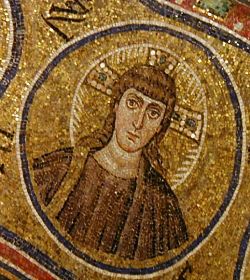 347-407
347-407Born: Antioch, Asia Minor. John's father died when he was young, and he was raised by a very pious mother. Well educated; studied rhetoric under Libanius, one of the most famous orators of his day. Monk. Preacher and priest for a dozen years in Syria. While there he developed a stomach ailment that troubled him the rest of his life. It was for his sermons that John earned the title Chrysostom = golden mouthed. They were always on point, they explained the Scriptures with clarity, and they sometimes went on for hours. Made a reluctant bishop of Constantinople in 398, a move that involved him in imperial politics. He criticized the rich for not sharing their wealth, fought to reform the clergy, prevented the sale of ecclesiastical offices, called for fidelity in marriage, encouraged practices of justice and charity. Archbishop and Patriarch of Constantinople. Revised the Greek Liturgy. Because John's sermons advocated a change in their lives, some nobles and bishops worked to remove him from his diocese; he was twice exiled from his diocese. Banished to Pythius, he died on the road. Greek Father of the Church. Proclaimed Doctor of the Church in 451. "When you are before the altar where Christ reposes, you ought no longer to think that you are amongst men; but believe that there are troops of angels and archangels standing by you, and trembling with respect before the sovereign Master of Heaven and earth. Therefore, when you are in church, be there in silence, fear, and veneration." - Saint John Chrysostom Prayer... Dear Saint John, your oratorical gifts inspired thousands and earned you the name "golden-mouthed." Continue to inspire Christians through your writings and grant us a rebirth of Christian preaching for the spiritual renewal of the Church. Obtain from God preachers like yourself who, animated by the Holy Spirit, effectively preach the Good News. Amen. 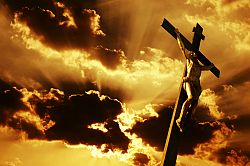 "We adore you, O Christ, and we bless you, for by thy Holy Cross you have redeemed the world."
"We adore you, O Christ, and we bless you, for by thy Holy Cross you have redeemed the world."The feast was celebrated in Rome before the end of the 7th century. Its purpose is to commemorate the recovering of that portion of the Holy Cross which was preserved at Jerusalem, and which had fallen into the hands of the Persians. Emperor Heraclius recovered this precious relic and brought it back to Jerusalem on 3 May 629. 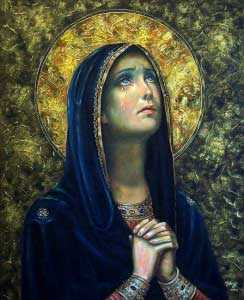 Names by which the Blessed Virgin Mary is referred to in relation to sorrows in her life:
Names by which the Blessed Virgin Mary is referred to in relation to sorrows in her life:The Prophecy of Simeon over the Infant Jesus (Luke 2:34) The Flight into Egypt of the Holy Family (Matthew 2:13) The Loss of the Child Jesus for Three Days (Luke 2:43) The Meeting of Jesus and Mary along the Way of the Cross (Luke 23:26) The Crucifixion, where Mary stands at the foot of the cross (John 19:25) The Descent from the Cross, where Mary receives the dead body of Jesus in her arms (Matthew 27:57) The Burial of Jesus (John 19:40) Prayer... "O Mary, Mother of Sorrows, I beseech thee, by the inexpressible tortures thou didst endure at the death of thy Son, offer to the Eternal Father, in my stead, thy beloved Son all covered with Blood and Wounds, for the grace of (mention your intention). Amen." - Prayer by St. John Vianney, the Cure of Ars 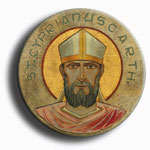 Bishop, Martyr and Doctor
Bishop, Martyr and Doctor190-258 Born to wealthy pagan parents. Taught rhetoric and literature. Adult convert in 246, taught the faith by Saint Caecilius of Carthage. Ordained in 247. Bishop of Carthage in 249. During the persecution of Decius, beginning in 250, Cyprian lived in hiding, covertly ministering to his flock; his enemies condemned him for being a coward and not standing up for his faith. As a writer he was second only in importance to Tertullian as a Latin Father of the Church. Friend of Saint Pontius. Involved in the great argument over whether apostates should be readmitted to the Church; Cyprian believed they should, but under stringent conditions. Supported Pope Saint Cornelius against the anti-pope Novatian. During the persecutions of Valerian he was exiled to Curubis in 257, brought back Carthage, and then martyred in 258. His name is in the Communicantes in the Canon of the Mass. Prayer for Prisoners and Correction Officers... Most gracious Father, bless with your special care all penitentiaries and homes of refuge. Look with pity on those who are housed there. Guide and protect those who have returned to the world. Grant all of them true contrition for past sins, and strengthen them in their good resolutions. Lead them along from grace to grace so that by the help of the Holy Spirit they may persevere in the ways of obedience and humility, and in the struggle against evil thoughts and desires. Grant the Holy Spirit to those engaged in teaching and training them, that they might have a right judgment with respect to those entrusted to them. May they labor for love of your with deep humility and singleness of purpose, purity of heart and life, and true zeal for your glory and the salvation of souls. Give them faith and love to sustain them in disappointment, love and patience toward those under them, and in your own good time crown their work with an eternal recompense. Amen. 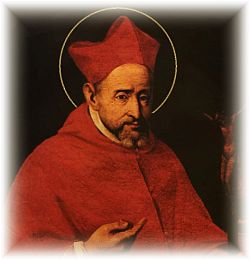 1542-1621
1542-1621Born: Montepulciano, Tuscany, Italy. Third of ten children of Vincenzo Bellarmine and Cinzia Cervini, a family of impoverished nobles. His mother, a niece of Pope Marcellus II, was dedicated to almsgiving, prayer, meditation, fasting, and mortification. Robert suffered assorted health problems all his life. Educated by Jesuits as a boy. Joined the Jesuits on 20 September 1560 over the opposition of his father who wanted Robert to enter politics. Studied at the Collegio Romano from 1560 to 1563, Jesuit centers in Florence, Italy in 1563, then in Mondovi, Piedmont, the University of Padua in 1567 and 1568, and the University of Louvain, Flanders in 1569. Ordained on Palm Sunday, 1570 in Ghent, Belgium. Professor of theology at the University of Louvain from 1570 to 1576. A the request of Pope Gregory XIII, he taught polemical theology at the Collegio Romano from 1576 to 1587. While there he wrote Disputationes de Controversiis Christianae Fidei adversus hujus temporis hereticos, the most complete work of the day to defend Catholicism against Protestant attack. Spiritual director of the Roman College from 1588. Taught Jesuit students and other children; wrote a children's catechism, Dottrina cristiana breve. Wrote a catechism for teachers, Dichiarazione piu copiosa della dottrina cristiana. Confessor of Saint Aloysius Gonzaga until his death, and then worked for the boy's canonization. In 1590 he worked in France to defend the interests of the Church during a period of turmoil and conflict. Member of the commission for the 1592 revision of the Vulgate Bible. Rector of the Collegio Romano from 1592 to 1594. Jesuit provincial in Naples, Italy from 1594 to 1597. Theologian to Pope Clement VIII from 1597 to 1599. Examiner of bishops and consultor of the Supreme Sacred Congregation of the Roman and Universal Inquisition in 1597; strongly concerned with discipline among the bishops. Created Cardinal-priest on 3 March 1598 by Pope Clement VIII; he lived an austere life in Rome, giving most of his money to the poor. At one point he used the tapestries in his living quarters to clothe the poor, saying that "the walls won't catch cold." Defended the Apostolic See against anti-clericals in Venice, Italy, and the political tenets of King James I of England. Wrote exhaustive works against heresies of the day. Took a fundamentally democratic position - authority originates with God, is vested in the people, who entrust it to fit rulers, a concept which brought him trouble with the kings of both England and France. Spiritual father of Saint Aloysius Gonzaga. Helped Saint Francis de Sales obtain formal approval of the Visitation Order. Noted preacher. Archbishop of Capua, Italy on 18 March 1602. Part of the two conclaves of 1605. Involved in disputes between the Republic of Venice and the Vatican in 1606 and 1607 concerning clerical discipline and Vatican authority. Involved in the controversy between King James I and the Vatican in 1607 and 1609 concerning control of the Church in England. Wrote Tractatus de potestate Summi Pontificis in rebus temporalibus adversus Gulielmum Barclaeum in opposition to Gallicanism. Opposed action against Galileo Galilei in 1615, and established a friendly correspondence with him, but was forced to deliver the order for the scientist to submit to the Church. Part of the conclave of 1621, and was considered for Pope. Theological advisor to Pope Paul V. Head of the Vatican library. Prefect of the Sacred Congregation of the Rites. Prefect of the Sacred Congregation of the Index. Proclaimed a Doctor of the Church on 17 September 1931. "Sweet Lord, you are meek and merciful." Who would not give himself wholeheartedly to your service, if he began to taste even a little of your fatherly rule?" - St. Robert Bellarmine 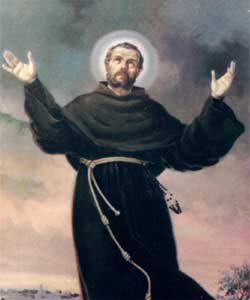 Italian.
Italian.1603-1664 Joseph's father, Felice Desa was a poor carpenter who died before the boy was born. Creditors drove his mother, Francesca Panara, from her home, and Joseph was born in a stable. Starting at age eight, he received ecstatic visions that left him gaping and staring into space. He had a hot temper, which his strict mother worked to overcome. Apprenticed to a shoemaker. At age 17 Joseph applied for admittance to the Friars Minor Conventuals, but was refused due to his lack of education. He applied to the Capuchins, was accepted as a lay-brother in 1620, but his ecstasies made him unsuitable for work, and he was dismissed. Abused by his family, he continued his prayers, and was accepted as an oblate at the Franciscan convent near Cupertino, Italy. His virtues were such that he became a cleric at 22, a priest at 25. Joseph still had little education, could barely read or write, but received such a gift of spiritual knowledge and discernment that he could solve intricate questions. His life became a series of visions and ecstasies, which could be triggered any time or place by the sound of a church bell, church music, the mention of the name of God or of the Blessed Virgin or of a saint, any event in the life of Christ, the sacred Passion, a holy picture, the thought of the glory in heaven, etc. Yelling, beating, pinching, burning, piercing with needles - none of this would bring him from his trances, but he would return to the world on hearing the voice of his superior in the order. He would often levitate and float (which led to his patronage of people involved in air travel), and could hear heavenly music. Even in the 17th century, there was interest in the unusual, and Joseph's ecstasies in public caused both admiration and disturbance in the community. For 35 years he was not allowed to attend choir, go to the common refectory, walk in procession, or say Mass in church. To prevent making a spectacle, he was ordered to remain in his room with a private chapel. He was brought before the Inquisition, and sent from one Capuchin or Franciscan house to another. But Joseph retained his joyous spirit, submitting to Divine Providence, keeping seven Lents of 40 days each year, never letting his faith be shaken. "Clearly, what God wants above all is our will which we received as a free gift from God in creation and possess as though our own. When a man trains himself to acts of virtue, it is with the help of grace from God from whom all good things come that he does this. The will is what man has as his unique possession." - Saint Joseph of Cupertino, from the reading for his feast in the Franciscan breviary 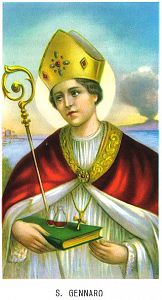 (St. Januarius of Naples)
(St. Januarius of Naples)Fourth century bishop of Benevento, Italy during the persecutions of Diocletian. Arrested while visiting imprisoned deacons, and then martyred with them. Prayer... O holy martyr Gennaro, the leader no less by the courage than by the pontifical dignity, your present glory increases our longing for Heaven; your past combats animate us to fight the good fight; your continual miracles confirm us in the faith. Praise and gratitude are therefore due to you on this day of your triumph; and we pay this our debt in the joy of our hearts. In return, extend to us the protection, of which the fortunate cities placed under your powerful patronage are so justly proud. Defend those faithful towns against the assaults of the evil one. In compensation for the falling away of society at large, offer to Christ our King the growing faith of all who pay you honor. Amen. 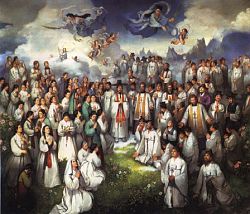 (Canonized by Pope John Paul II, May 6, 1984)
(Canonized by Pope John Paul II, May 6, 1984)There are 103 martyrs in this group....priests, missionaries and lay people who died in the early days of the Church in Korea. Most were murdered during waves of persecutions in 1839, 1846 and 1867. Almighty Father, You have created all nations and You are their salvation. In the land of Korea, Your call to the Catholic faith formed a people of adoption whose growth You nurtured by the blood of Saints Andrew Kim Taegon, Paul Chong Hasang, and their companions. Through their intercession, give us the strength to always remain faithful to Your commandments and to courageously and boldly proclaim the gospel message to all your people through our actions and our words. We ask this through in the precious name of Our Lord Jesus Christ. Amen. 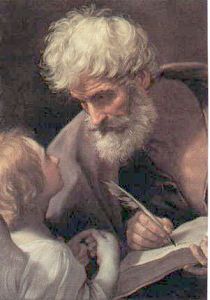 Son of Alphaeus, he lived at Capernaum on Lake Genesaret (Sea of Galilee). He was a Roman tax collector, a position equated with collaboration with the enemy by those from whom he collected taxes. Jesus' contemporaries were surprised to see the Christ with a traitor, but Jesus explained that he had come "not to call the just, but sinners."
Son of Alphaeus, he lived at Capernaum on Lake Genesaret (Sea of Galilee). He was a Roman tax collector, a position equated with collaboration with the enemy by those from whom he collected taxes. Jesus' contemporaries were surprised to see the Christ with a traitor, but Jesus explained that he had come "not to call the just, but sinners."Matthew's Gospel is given pride of place in the canon of the New Testament, and was written to convince Jewish readers that their anticipated Messiah had come in the person of Jesus. He preached among the Jews for 15 years; his audiences may have included the Jewish enclave in Ethiopia, and places in the East. Prayer... O Glorious Saint Matthew, in your Gospel you portray Jesus as the longed-for Messiah who fulfilled the Prophets of the Old Covenant and as the new Lawgiver who founded a Church of the New Covenant. Obtain for us the grace to see Jesus living in his Church and to follow his teachings in our lives on earth so that we may live forever with him in heaven. Amen. 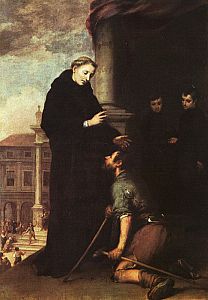 Spanish.
Spanish.1488 - 1555 St. Thomas was from Castile in Spain and received his surname from the town where he was raised. He received a superior education at the University of Alcala and became a popular professor of philosophy there. After joining the Augustinian friars at Salamanca he was ordained and resumed his teaching-despite a continuing absentmindedness and poor memory. He became prior and then provincial of the friars, sending the first Augustinians to the New World. He was nominated by the emperor to the archbishopric of Granada, but refused. When the see again became vacant he was pressured to accept. The money his cathedral chapter gave him to furnish his house was given to a hospital instead. His explanation to them was that "our Lord will be better served by your money being spent on the poor in the hospital. What does a poor friar like myself want with furniture?" He wore the same habit that he had received in the novitiate, mending it himself. The canons and domestics were ashamed of him, but they could not convince him to change. Several hundred poor came to Thomas's door each morning and received a meal, wine and money. When criticized because he was at times being taken advantage of, he replied, "If there are people who refuse to work, that is for the governor and the police to deal with. My duty is to assist and relieve those who come to my door." He took in orphans and paid his servants for every deserted child they brought to him. He encouraged the wealthy to imitate his example and be richer in mercy and charity than they were in earthly possessions. Criticized because he refused to be harsh or swift in correcting sinners, he said, "Let him (the complainer) inquire whether St. Augustine and St. John Chrysostom used anathemas and excommunication to stop the drunkenness and blasphemy which were so common among the people under their care." As he lay dying, Thomas commanded that all the money he possessed be distributed to the poor. His material goods were to be given to the rector of his college. Mass was being said in his presence when after Communion he breathed his last, reciting the words: "Into your hands, O Lord, I commend my spirit." Thomas of Villanova was already called in his lifetime "the almsgiver" and "the father of the poor." He was canonized in 1658. Prayer of St. Thomas of Villanova... "I will love you, Lord, in every way and without setting limits to my love. You set no limits to what you have done for me; you have not measured out your gifts. I will not measure out my love. I will love you, Lord, with all my strength, with all my powers, as much as I am able." 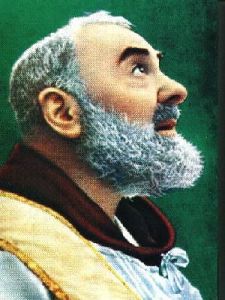 May 25, 1887 - September 23, 1968
May 25, 1887 - September 23, 1968Born to a southern Italian farm family, the son of Grazio, a shepherd. At age 15 he entered the novitiate of the Capuchin friars in Morcone, Italy and joined the order at age 19. Suffered several health problems, and at one point his family thought he had tuberculosis. Ordained at age 22 on 10 August 1910. While praying before a cross, he received the stigmata on 20 September 1918, the first priest ever to be so blessed. As word spread, especially after American soldiers brought home stories of Padre Pio following WWII, the priest himself became a point of pilgrimage for both the pious and the curious. He would hear confessions by the hour, reportedly able to read the consciences of those who held back. Reportedly able to bilocate, levitate, and heal by touch. Founded the House for the Relief of Suffering in 1956, a hospital that serves 60,000 a year. In the 1920's, he started a series of prayer groups that continue today with over 400,000 members worldwide. His canonization miracle involved the cure of Matteo Pio Colella, age 7, the son of a doctor who works in the House for Relief of Suffering, the hospital in San Giovanni Rotondo founded by Padre Pio. On the night of 20 June 2000, Matteo was admitted to the intensive care unit of the hospital with meningitis. By morning, doctors had lost hope for him as nine of the boy's internal organs had ceased to give signs of life. That night, during a prayer vigil attended by Matteo's mother and some Capuchin friars of Padre Pio's monastery, the child's condition improved suddenly. When he awoke from the coma, Matteo said that he had seen an elderly man with a white beard and a long, brown habit, who said to him: "Don't worry, you will soon be cured." The miracle was approved by the Congregation and Pope John Paul II on 20 December 2001. "Pray, hope, and don't worry. Worry is useless. God is merciful and will hear your prayer." "Prayer is the best weapon we have; it is the key to God's heart. You must speak to Jesus not only with your lips, but with your heart. In fact on certain occasions you should only speak to Him with your heart." 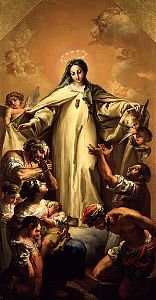 Blessed Virgin Mary,
Blessed Virgin Mary,who can worthily repay you with praise and thanks for having rescued a fallen world by your generous consent! Receive our gratitude, and by your prayers obtain the pardon of our sins. Take our prayers into the sanctuary of heaven and enable them to make our peace with God. Holy Mary, help the miserable, strengthen the discouraged, comfort the sorrowful, pray for your people, plead for the clergy, intercede for all women consecrated to God. May all who venerate you feel now your help and protection. Be ready to help us when we pray, and bring back to us the answers to our prayers. Make it your continual concern to pray for the people of God, for you were blessed by God and were made worthy to bear the Redeemer of the world, who lives and reigns forever. Amen. -Prayer by St. Augustine of Hippo 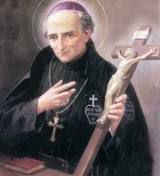 Italian.
Italian. 1745-1824 Son of a druggist. His parents encouraged his vocation of a parish priest. Ordained in 1767. Joined the Passionists in 1768 after a retreat led by Saint Paul of the Cross. Professor of theology. Passionist provincial in 1781. Bishop of Macerata-Tolentino, Italy in 1801. Exiled in 1808 for refusing to take an oath of allegiance to Napoleon, but returned in 1813 after Napoleon's downfall. Saved Macerata from being sacked by Murat's troops. Instituted reforms throughout his diocese, ending such corruption that he received death threats. Indefatigable missioner and preacher. Worked with and for his people in during a typhus epidemic. On the death of Pope Pius VII, he resigned his see to become an advisor to Pope Leo XII. Prayer... All powerful and ever living God, you made your bishop Saint Vincent Mary Strambi a devoted shepherd of your flock and a faithful servant of your Church. Strengthen us by his example to love our neighbor and work for justice as members of your Church. We ask this through our Lord Jesus Christ, your Son, who lives and reigns with you and the Holy Spirit, one God, for ever and ever. Amen. 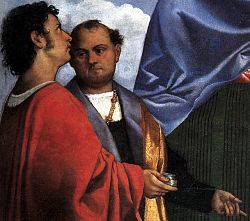 Sts. Cosmas and Damian were brothers, born in Arabia, who had become eminent for their skill in the science of medicine. Being Christians, they were filled with the spirit of charity and never took money for their services. At Egaea in Cilicia, where they lived, they enjoyed the highest esteem of the people. When the persecution under Diocletian broke out, their very prominence rendered them marked objects of persecution. Being apprehended by order of Lysias, governor of Cilicia, they underwent various torments about the year 283. They are patron saints of pharmacists.
Sts. Cosmas and Damian were brothers, born in Arabia, who had become eminent for their skill in the science of medicine. Being Christians, they were filled with the spirit of charity and never took money for their services. At Egaea in Cilicia, where they lived, they enjoyed the highest esteem of the people. When the persecution under Diocletian broke out, their very prominence rendered them marked objects of persecution. Being apprehended by order of Lysias, governor of Cilicia, they underwent various torments about the year 283. They are patron saints of pharmacists. Prayer... Oh glorious martyrs of Christ, Saints Cosmas and Damian, you gave your lives for the love of God, benefiting your fellow man, and crowning your martyrdom with an open and loyal profession of your faith. You taught us to love God above all things, and to love our fellow man as ourselves, professing always, and without fear, the religion of Jesus. Augmenting amongst the faithful populace many miracles, you are glorious indeed. Through your intercession, which brings about deliverance of these miracles, we pray to you for your aid in all things. May your patronage never be far from us in the illness of our body and soul. Oh great protectors, Saints Cosmas & Damian, assist us with your love and free us from all evils. Amen.  French.
French.1581-1660 Born to a peasant family. A highly intelligent youth, Vincent spent four years with the Franciscan friars at Acq, France getting an education. Tutor to children of a gentlemen in Acq. He began divinity studies in 1596 at the University of Toulouse. Ordained at age 20. Taken captive by Turkish pirates to Tunis, and sold into slavery. Freed in 1607 when he converted one of his owners to Christianity. Returning to France, he served as parish priest near Paris where he started organizations to help the poor, nursed the sick, found jobs for the unemployed, etc. Chaplain at the court of Henry IV of France. With Louise de Marillac, founded the Congregation of the Daughters of Charity. Instituted the Congregation of Priests of the Mission (Lazarists). Worked always for the poor, the enslaved, the abandoned, the ignored, the pariahs. "The most powerful weapon to conquer the devil is humility. For, as he does not know at all how to employ it, neither does he know how to defend himself from it." - Saint Vincent de Paul Prayer... Dear Saint Vincent de Paul, the mere mention of your name suggests a litany of your virtues: humility, zeal, mercy, self-sacrifice. It also recalls your many foundations: Works of Mercy, Congregations, Societies. And the Church gratefully remembers your promotion of the priesthood. Inspire all Charitable Workers, especially those who minister to the poor - both the spiritually and the materially poor. Amen. 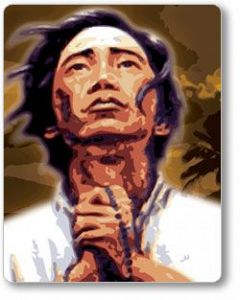 1600-1637, First Filipino Saint
1600-1637, First Filipino SaintChinese father, Filipino mother, both Christians. He learned Chinese and Tagalog from them, Spanish from the Dominicans whom he served as altar boy and sacristan. Professional calligrapher and documents transcriptionist. Member of the Confraternity of the Holy Rosary. Married layman, and the father of two sons and a daughter. For unknown reasons, Lorenzo was accused of murder. He sought asylum on board ship with three Dominican priests, Saint Antonio Gonzalez, Saint Guillermo Courtet, and Saint Miguel de Aozaraza, a Japanese priest, Saint Vicente Shiwozuka de la Cruz, and a layman named Saint Lazaro of Kyoto, a leper. Only when they were at sea did he learn that they were going to Japan during a time of intense Christian persecution. Lorenzo could have gone to Formosa (modern Taiwan), but feared the Spaniards there would hang him, and so stayed with the missionaries as they landed at Okinawa. The group was soon exposed as Christian, arrested, and taken to Nagasaki. They were tortured in several ways for days. Lawrence and the Japanese priest broke at one point, and were ready to renounce their faith in exchange for release, but after their moment of crisis, they reclaimed their faith and defied their tormentors. First canonized Filipino martyr. "I am a Christian, and this I profess until the hour of my death and for God I shall give my life. Although I did not come to Japan to be a martyr, nevertheless as a Christian and for God I shall give my life." - St. Lorenzo Ruiz 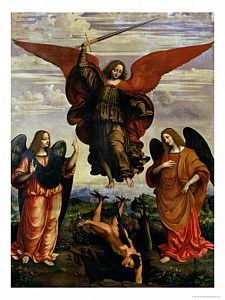 Each of these archangels performs a different mission in Scripture: Michael protects; Gabriel announces; Raphael guides.
Each of these archangels performs a different mission in Scripture: Michael protects; Gabriel announces; Raphael guides. Michael appears in Daniel's vision as "the great prince" who defends Israel against its enemies; in the Book of Revelation, he leads God's armies to final victory over the forces of evil. Devotion to Michael is the oldest angelic devotion, rising in the East in the fourth century. The Church in the West began to observe a feast honoring Michael and the angels in the fifth century. Gabriel also makes an appearance in Daniel's visions, announcing Michael's role in God's plan. His best-known appearance is an encounter with a young Jewish girl named Mary, who consents to bear the Messiah. Raphael's activity is confined to the Old Testament story of Tobit. There he appears to guide Tobit's son Tobiah through a series of fantastic adventures which lead to a threefold happy ending: Tobiah's marriage to Sarah, the healing of Tobit's blindness and the restoration of the family fortune. The memorials of Gabriel (March 24) and Raphael (October 24) were added to the Roman calendar in 1921. The 1970 revision of the calendar joined their feasts to Michael's. Prayer to the Archangels... St. Michael, St. Gabriel & St. Raphael, be with me today. Protect me from whatever could cause spiritual or physical harm. Help me be faithful to Jesus and a good communicator of his divine love. Amen. 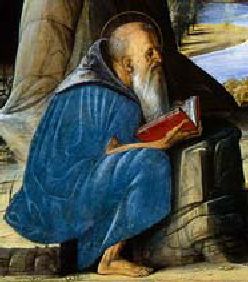 Born in 347 to a rich pagan family in Dalmatia,
Born in 347 to a rich pagan family in Dalmatia,he led a misspent youth. Studied in Rome. Lawyer. Converted in theory, and baptized in 365, he began his study of theology, and had a true conversion. Monk. Lived for years as a hermit in the Syrian deserts. Reported to have drawn a thorn from a lion's paw; the animal stayed loyally at his side for years. Priest. Student of Saint Gregory of Nazianzen. Secretary to Pope Damasus I who commissioned him to revise the Latin text of the Bible. The result of his 30 years of work was the Vulgate translation, which is still in use. Friend and teacher of Saint Paula, Saint Marcella, and Saint Eustochium, an association that led to so much gossip that Jerome left Rome to return to the desert solitude. He lived his last 34 years in the Holy Land as a semi-recluse. Wrote translations of histories, biographies, the works of Origen, and much more. Doctor of the Church, Father of the Church. Since his own time, he has been associated in the popular mind with scrolls, writing, cataloging, translating, which led to those who work in such fields taking him as their patron - a man who knew their lives and problems. Prayer of St. Jerome for Christ's Mercy... "O Lord, show your mercy to me and gladden my heart. I am like the man on the way to Jericho who was overtaken by robbers, wounded and left for dead. O Good Samaritan, come to my aid, I am like the sheep that went astray. O Good Shepherd, seek me out and bring me home in accord with your will. Let me dwell in your house all the days of my life and praise you for ever and ever with those who are there." |




